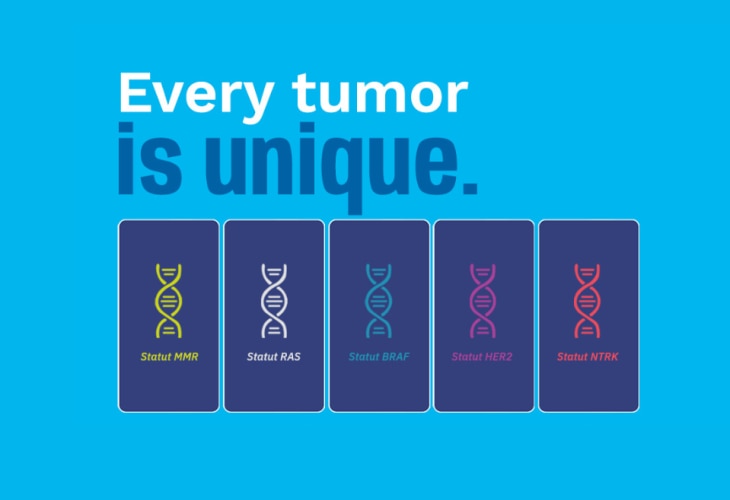Metastatic Colorectal Cancer World Day
24 September 2025
This September 24th, we come together for Metastatic Colorectal Cancer (mCRC) World Day. This day is an important time for patients, families, and healthcare professionals to share information, raise awareness, and support.
This day serves as a collective call to action, to expand our understanding of mCRC and highlight the importance of early detection, personalized treatment, and ongoing support for those living with mCRC.
By understanding the unique features of each person's cancer, especially tumor biomarkers, we can open the door to more personalized therapies, and possibly, to greater hope.
Raising awareness about metastatic colorectal cancer and encouraging proactive conversations about testing, treatment options, and support resources are crucial steps in improving outcomes and quality of life.
Together, we can foster a community where no one faces this diagnosis alone, and where access to information leads to informed choices and better care for all.
Why is it important to know about CRC tumour biomarkers?
Every colorectal cancer is unique. Knowing its characteristics is like having the ID card of the tumour. When we look for tumours molecular characterization, it is called molecular testing.
The type of colorectal cancer influences, among other things, the following:
• Prognosis (the likely course of cancer)
• Treatment options available (which can vary depending on tumour type)
Biomarkers and molecular testing are becoming increasingly important. In addition to their prognostic value, some of them also have a predictive value for the effectiveness of some treatments 1.
When should metastatic colorectal cancer patients be tested for biomarkers?
For most patients diagnosed with metastatic colorectal cancer (stage IV), biomarker testing is recommended before starting any therapy to choose the best treatment strategy. As recommended by European guidelines (ESMO), RASi , BRAFii and MSI-H/dMMRiii status should be known prior to2.
Every tumore is unique
Knowing its characteristics is like having the tumour’s identity card. The analysis of these biomarkers is called molecular testing. Knowing your biomarker profile is important as it can affect: The course of the disease & The treatment strategy
Want to learn more about biomarker testing?
1. Ask your healthcare team
2. Ask your local patient organization
3. You can also consult dedicated material and contents made by, with and for patients:
Find more information about biomarker testing
CRC facts and figures
- Approximately 1.9 million cases are diagnosed annually, of which approximately 538.000 are diagnosed in Europe3
- Globally, the prevalence of CRC is expected to rise to more than 3 million cases per year by 20404
- Colorectal cancer (CRC) is third most common cancer in the world3, with 1 in 5 people diagnosed when the disease has already metastasised (stage IV)5
Want to learn more about Pierre Fabre and our commitment to colorectal cancer ?
References:
1. Sveen A, Kopetz S, Lothe RA. Biomarker-guided therapy for colorectal cancer: strength in complexity. Nat Rev Clin Oncol [Internet]. 2020;17(1):11–32. Available from: http://dx.doi.org/10.1038/s41571-019-0241-1
2. Cervantes A, Adam R, Roselló S, Arnold D, Normanno N, Taïeb J, et al. Metastatic colorectal cancer: ESMO Clinical Practice Guideline for diagnosis, treatment and follow-up. Ann Oncol [Internet]. 2023;34(1):10–32. Available from: http://dx.doi.org/10.1016/j.annonc.2022.10.003
3. The Global Cancer Observatory, 2022. International Agency for Research on Cancer, World Health Organization [cited 2025 Sept 5]. Available from: https://gco.iarc.who.int/media/globocan/factsheets/cancers/8-colon-fact-sheet.pdf
4. Gunter MJ, Alhomoud S, Arnold M, Brenner H, Burn J, Casey G, et al. Meeting report from the joint IARC-NCI international cancer seminar series: a focus on colorectal cancer. Ann Oncol [Internet]. 2019;30(4):510–9. Available from: http://dx.doi.org/10.1093/annonc/mdz044
5. Biller LH, Schrag D. A review of the diagnosis and treatment of metastatic colorectal cancer-reply. JAMA [Internet]. 2021;325(23):2405. Available from: http://dx.doi.org/10.1001/jama.2021.6027
i RAS: RAS is a gene producing the KRAS protein which has a major role in the regulation of the cell cycle.
ii BRAF: BRAF is a gene producing a protein having the same name, BRAF. The BRAF protein is produced when the cell needs to grow. An irregularity in the production of BRAF can cause the cells to grow continuously, leading to cancer development.
iii MSI-H/dMMR: The DNA holds mismatch repair (MMR) genes which are involved in repairing our genetic code if it is wrongly duplicated during the process of cell replication. When the MMR process is working properly the cells are defined as MicroSatellite Stable (MSS), while a mutation in MMR genes may cause MMR deficiency, this can lead to microsatellite instability (MSI-high or MSI-H).
HQ--09-25-2500006


